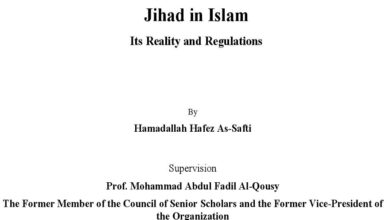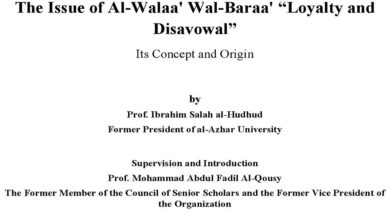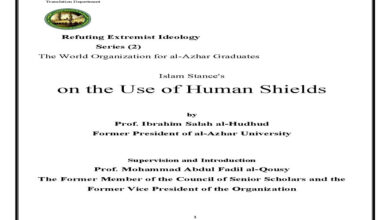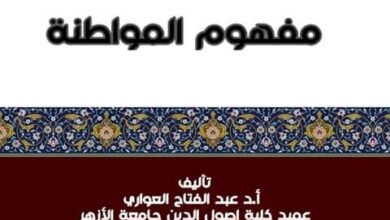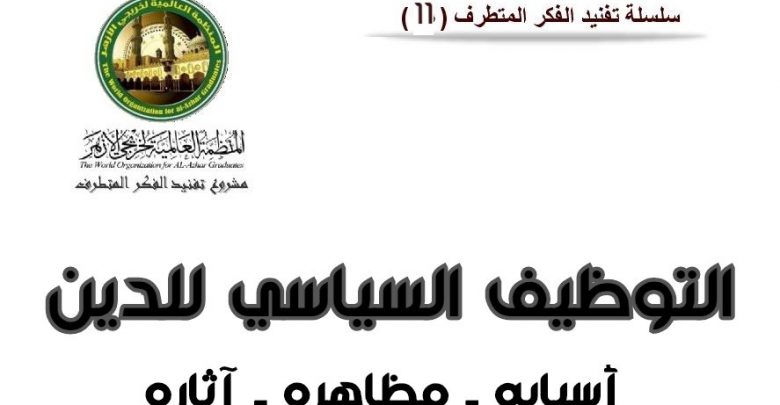
By: Prof. Ibrahim Salah al-Hodhod
Former President of al-Azhar University
In the Name of Allah, the All-Merciful, the Ever-Merciful
Introduction
This research is written during hard and difficult times witnessed by the Islamic Ummah. This is due to some actions of a small group of Muslims; these actions spring from religious motives: they shed blood in the name of religion and they take women as captives in the name of religion, etc. Unfortunately, some biased people used these actions to portray and produce a negative as well a distorted image of Islam. They even addressed people embracing Islam in order to become deeply convinced that the good for them does lie in neither following nor believing in this religion. However, in each religion or human thought, there must be a group of people who stray off the mainstream religion or thought, who have troubles with their religious beliefs and consequently act in a manner that wrong them but never wrong the religion they follow. In this regard, can we Muslims mistrust all Western Christians or the entire West because some of them disrespected, drew or produced hateful cartoons or films about Prophet Muhammad (PBUH)?
We could not attribute all of this to the West as we are sure that these are extremist actions. Springing from impartiality, we must carefully consider each actions prior to passing judgements and producing stereotypes. In this regard this research is comprised of the following themes:
- Causes of manipulation of religion for political ends: This includes doctrinal motives, grudges of people who embraced Islam with their tongues only but not with their hearts and struggle over power.
- Aspects of manipulation of religion for political ends: This includes fabrication of Hadiths for political ends, interpretation of Quranic verses for serving politics, oppressing political opponents and winning the support of authorities to back a religious opinion against another.
- Impacts of manipulation of religion for political ends: This includes frequent wars among Muslims, bloodshed, violence, weakness of Muslims as well as torturing scholars.
Points for Clarification
The concept of religion according to materialistic philosophies is: An illusion of the human mind.
On the contrary, the concept of religion from a divine perspective: The divine message revealed to Messengers and Prophets of Allah in order to guide people who have minds and reason towards guidance as well as good in this world and the Hereafter. (See Muhammad Imarah, Fiqh al-Hdarah al-Islamyiiah and Abu Al-Baqa Al-Kafawi, al-Kulliaat)
‘Politics’ is a term used and repeated by all nations, peoples and cultures. However, it means in the Western civilization: The art of the possible from reality in order to attain power, disregarding the relation between political aspects and values as well as ethics. On the contrary, Islam correlates political aspects with values and ethics. Politics in this regard is: Aspects that render people close to righteousness and away from corruption.
Causes of Manipulation of Religion for Political Ends
- Doctrinal Motives:
Adversaries of Islam from hypocrites, heretics and Jews made use of the tolerance of Uthman ibn Affan (RA) and sowed the first seeds of fitnah (strife). Abdullah ibn Saba, a Jew who converted to Islam, bore responsibility for this fitnah; he carried out his actions under the pretext of the love of Ali ibn Abi Talib (RA) and Ahl al-bayt. He then propagated the idea that Ali (RA) has the right to be a Khalifa (a Caliph). He also fabricated Hadiths to support his stance: the forged Hadith is an example “Each Prophet has a successor and my successor is Ali”. He even alleged the divinity of Ali (RA). This led Uthman (RA) to pursue him and Ali (RA) to render killing him lawful.
Unfortunately, his allegations echoed strongly especially in Egypt. This fitnah resulted in the killing of Uthman (RA) and fierce wars broke out among Muslims during the Caliphate of Ali (RA). As a consequence, some Shiites factions emerged to support Ali (RA), others to support Uthman (RA) and Muawiyah, besides antagonism between Khawarij and Shiites. Since year 36 H, some of these factions permitted themselves to support their whims using Hadiths, interpretations and biographies. (see: Muhammad Abu Shuhbah, al- ʼisrāʼilliyyāt wa al-mawḍūʻāt fī kutub al-tafāsīr). Animosity also intensified among political parties. After that and during the Abbasid Caliphate, people with weak faith got closer to the Caliphate by exaggerating its good aspects and degrading its enemies. They even fabricated Hadiths to please Caliphs.
Moreover, the modern age is not far from what took place in earlier ages. In the same way, people followed the footsteps of those who strayed off the mainstream. The problem is that each sect or school of thought believes that its dawah is the only right path. In this regard, Hassan al-Banna, the First General Guide of the Egyptian Muslim Brotherhood, mentioned, addressing Muslim Brotherhood, that past and present experiences proved that there is no good but in their path, no production without their plans and no right actions except theirs. He also advised them not to risk their efforts. This perspective is one of the worst ones when the matter comes to viewing other Muslims. How then would non-Muslims view Muslims? Any path which is not theirs is considered misleading and any action which is not theirs is worthless. Hassan al-Banna also mentioned that Muslim Brotherhood have profound insights and thinking and that they are aware that the first degree of power and strength is the power of doctrine and faith, the second degree is that of unity and the third degree is that of the hand and arms. Thus, part of the allegiance is to swear oath on the Holy Quran and the gun. It also includes reminding those who affiliate to them with the Holy verses of qital and that it is an individual duty for the victory of Islam.
Imam al-Ghazali and Shaykh Sayed Sabik were regarded as people of hell by Muslim Brotherhood youth.
Moreover, this did not only apply in past times but it continued until present times as well. This is demonstrated by Prof. Gamal Abdul Hady mentioning in one of his lectures that we cannot accuse somebody of kufr unless there is a lawful evidence. Thus, it is not lawful to declare people as kafirs (infidels) unless there is an evidence related to a say or an action. However, governments and regimes could be declared as infidels when they do not apply Islamic Shariah (legislation) while knowing that they have to apply it and when they had been warned by ahl al-Ilm and ahl al-Fiqh. He added that since they had already warned Egyptian governments beforehand therefore they are regarded as governments of kufr.
B. The Malevolence of Those who Pretended to be Muslims:
Many of the Jews, Persians, Romans and others insinuated corrupted narrations into Islam; indeed, those intruders pretended to convert into Islam, while concealing their evil, hatred and animosity towards Islam. Due to their fear of confrontations with Muslims in the battlefields, those intruders falsely declared their devotion to Aal al-Bayt, falsified narrations and ascribed them to Prophet Muhammad (PBUH), as well as misinterpreting the Qur’anic verses and the occasions of their revelation. Additionally, they deliberately defamed the reputation of many of the senior Islamic figures such as: Abu Bakr, Othman, Aisha Bint Abi Bakr, Amr Ibn al-As, Muawiyah and others. Moreover, the Abbasid Partisans did the same thing when they ascribed false narrations to Ibn Abbas (portraying him as if he knew everything), as well as the Umayyads, whose supporters replied to these falsifications in the same heinous manners.
Hamad Ibn Zayed mentioned that: “the Heretics falsified fourteen thousands Hadiths”; Abdul kareem Ibn Abi al-Awga’ who lived at the time of al-Mahdi (160 H.) admitted that he falsified four thousands Hadiths, where he endorsed the prohibited and forbade the permissible. Indeed, he publicly followed ar- Rafida, while implicitly he concealed his belief in Manichaeism.
In the same vein, al-Khawarij, al-Qadariyah, al-Murji’ah, al-Karramiyya, al-Batiniyya and others, followed the same mischievous pattern of falsifying Hadiths to support their cause and schools; their counterparts of Muawiyah’s partisans did the same things, and ascribed fake hadiths to the Prophet (PBUH) such as: “the genuine are three: me, Gabriel and Muawiyah“, “you are from me Muawiyah and I am from you“, “I will not miss anyone in the Heavens except Muawiyah; then he will join me in the Heavens, I shall ask him then: where have you been Muawiyah? He shall say: having a talk with Allah Almighty; then I shall say: this is your reward for you good deeds in life“.
In the same context, the Abbasid partisans – in order to counteract the false Hadith concerning the rule of Ali after the decease of the Prophet (PBUH)- they faked another Hadith tackling the rule and the guardianship of al-Abbas after the death of the Prophet, which came as follows: “al-Abbas is my heir and successor“. Indeed, falsifying Hadiths was very prominent especially among the Shi’i fanatics and their enemies as well, that such manner affected the ruling systems at such time.
C. Power Struggle:
For nearly thousand and four hundred years, the Islamic nation witnessed a heated struggle for power, where each struggling party manipulated Islam to serve their cause, either by misinterpretation or adding false and faked religious texts. When the Umayyad Caliphate was established, Abdul Allah Ibn al-Zubayr fought the Umayyads for his right to rule, and at the time of Yazid Ibn Mu’awiyah, most of the Islamic lands pledged allegiance to Abdul Allah Ibn al-Zubayr, while al-Khawarij kept on fighting the Umayyads to rule, where a group of them supported Aal al-Bayt, inciting them to fight the Umayyads to seize the Caliphate. After the downfall of the Umayyads, the Abbasids came and as usual al-Khawarij fought them to seize power, and war kept going on, till the Islamic nation got divided into small states.
Aspects of Manipulation of Religion for Political Ends
A. Composing False Hadiths to Support Political Causes:
- Al-Dhahabi narrated that Khuzaima Ibn Nasr mentioned that: “I heard Ali when we were in Siffin saying: May Allah fight them, such infamous group that falsified and corrupted the Prophetic Hadith“. The group meant her are ar-Rafida and Shi’a, who falsified about 300 Hadiths in support of Ali and other false Hadiths in calumniating Mu’awiyah, such as: “If you see Mu’awiyah on my pulpit, then kill him“, and another false Hadith to defame Amr Ibn al-As as well as Mu’awiyah: “May Allah curse them dwelling in Fitnah and chastise them in Hell“.
- Some of these infamous groups intended to draft false Hadiths in order to please caliphs; e.g. Abu al-Bukhturi the Liar, who was once a judge, was in the presence of ar-Rashid while flying some of the pigeons, ar-Rashid asked him: “do you know any Hadith concerning pigeons? Al-Bukhturi narrated a false one, that ar-Rashid said: except for you are one of Quraysh, i would have had you displaced “.
Again, Ghiath Ibn Ibrahim was in the presence of al-Mahdi, while playing with pigeons, and narrated a fake Prophetic Hadith: “there shall be no contest except for swords, hoofs and birds” al-Mahdi said then: “I swear to Allah you are a liar” and ordered to slaughter all the pigeons.
B. The Misinterpretation of Qur’an to Serve Political Causes:
It was mentioned in Jamiʿ al-Bayan that: “the Islamic nation shall fall due to the misinterpretation of Qur’an“. Omar Ibn al-Khattab once wondered: “how come a nation with one Prophet and one direction (Qibla) may differ and fight each other?” Ibn al-Abbas replied: “O Amir al-Mu’minin, we have witnessed the inspiration of Qur’an, we have read it and righteously apprehended it; yet, peoples after us will read Qur’an and shall not conceive the causes of inspiration, hence, they shall misinterpret it in different ways, and once they differ, they shall fight each other”. Omar got angry with what Ibn al-Abbas said, he sent him away, reconsidered what he said, he called for him again and asked him to repeat what he said; at such moment, Omar grasped what Ibn al-Abbas meant”.
Al-Shatibi mentioned the narration of Ibn Wahb in which Bakir asked Nafi‘: “what was Omar’s opinion in al-Haruriyya (a group of Khawarij)?” Nafi’ said: “Omar sees them as the wickedest people of all, who misinterpreted Qur’an and applied the verses, concerning pagans, to believers“.
In the same vein, the fallacy schools such as Shi’a, al-Muʿtazila and similar groups, used to misinterpret the Qur’anic verses to serve specific causes and interests. Additionally, groups such as Batiniyya, ar-Rafida, some of the Sufis and atheists misinterpreted the Qur’anic verse: “And Solomon inherited from Dawood” [Q.27.16] to imply that Ali inherited the knowledge of Prophet Mohammad (PBUH), and that Kaaba is the Prophet, and its door is Ali. Again, they misinterpreted the verse “He let forth the two seas that meet together… From them come forth the pearl and the coral” [Q.55.19-22] implying that the two seas are Ali and Fatima, and that the pearl and coral indicate their sons, al-Hassan and al-Hussein. Also, they indicated that the cow in “Allah commands you to sacrifice a cow” [Q.2.67] refers to Aisha, and the two hands in “Perish the hands of Abū Lahab and perish he” [Q.111.1] are Abu Bakr and Omar, and ” If thou associate other gods with Allah, thy work shall surely fail and thou wilt be among the losers” [Q.39.65] refers to Abu Bakr and Omar sharing Ali in the Caliphate.
C. Oppressing the Opponents:
Subsequently, and amid such conflicts, opponents were inflicted to all kinds of oppression; banishment, imprisonment and assassination. Unfortunately, such dreadful incidents were supported with religious evidences; eventually, we have mentioned some examples of the conflicts and the torture of scholars then.
No wonder that each of the abovementioned groups shall oppress whoever contradicted it, to the extent of assassinating him or socially confining and harassing him. The reader may use the following books as references, which are: “The Aspects of Right in our Modern Islamic Struggle” by Sheikh Mohammad al-Ghazali, “Gamal Abdul Nasser and Manshia incident” by Mahmoud ‘Assaf, “The Core of al-Ikhwan… The Group’s Inquisitions“, by Tharwat Al-Kharbawi, 4th Edition, Nahdet Misr for Publications.
D. Appealing to the Authorities to Support a Religious opinion against Another:
Such strategy has been taking place since the early centuries, where the authority in the Abbasid state advocated the claim that Qur’an has been created, and the opponents to such claim were imprisoned and tortured. Indeed, al-Muʿtazila were having a strong influence on the Abbasid rulers and caliphs, which resulted in Fitnah and the conflicts that distinguished the Abbasid era, till Allah Almighty brought peace to the Islamic nation.
The Impacts of Manipulation of Religion for Political Ends
A. The Frequent Wars between Muslims:
Due to the political and doctrinal conflicts, frequent and multiple wars had broken among Muslims; unfortunately, each faction and group took religion as a cover to justify their wars. Astonishingly, the Islamic infightings took place in parallel with the Umayyad Islamic conquests, especially between the years 40-132 H., where Muslims reached Andalusia, Russia and North Africa. Indeed, most of the greatest Islamic conquests occurred in this period of time, however, the internal conflicts were multiple and occurring frequently, where thousands of Muslims were slaughtered by the hands of other Muslims. Among the most famous battles among Muslims was the Battle of the Camel (36 H.), when ʾUmm al-Muʾminīn, Aisha Bint Abi Bakr, took her camel and headed an army against the army of Ali, demanding the vengeance for the murder of Othman, or to hand over his murderers. The fight took place between the two armies, where Talhah Ibn Ubaydullah and Zubayr Ibn al-Awam and others of the Prophet’s Companions got killed. In the year 37 H, the battle of Siffin took place between Ali and Mu’awiyah, where the people of the Levant raised copies of the Holy Qur’an and called for arbitration after days of fighting. In 38 H, al-Khawarij, who were about six thousand soldiers, protested against Ali for accepting the arbitration; hence, Ibn Abbas wore his best outfit, and went to them, to convince them with the arbitration. Ibn Abbas said: “I came to you with a message from Amir al-Mu’minin. He asked them: “are you going to fight the Prophet’s cousin and son in law?” they got divided, some said: “do not talk to him, as Allah Almighty says: “Nay, but they are a contentious lot” [Q.43.58]. Others said: “we shall not take by Ali’s judgments, we shall abide by the judgments of Allah Almighty” adding: “we blame Ali for three matters: first, he let other men give their judgments and arbitrations in a matter that shall be decided according to Allah’s judgment. Second, Ali is a murderer, where during the battle he neither took captives nor did he take spoils or booties; hence his fight was unlawful. Third, Ali would not use the title “Amir al-Mu’minin”; if he is not Amir al-Mu’minin, then, he is the Amir of Pagans“. Ibn Abbas refuted all their claims, which resulted in: one third of them backed down, and the rest of them got killed in the battle of Nahrawan in 37 H., where their leader then was Abdul Allah Ibn Wahb al-Rasibi. Indeed, during that battle, the army of al-Khawarij committed highway robberies, killed the Dhimmis as well as murdering 12 of Ali’s companions. In the year 39 H, al-Khawarij appeared in Harwra’, in al-Nukhaylah; as a matter of fact, al-Khawarij are those who abandoned the moderate Islamic teachings, turned into fanatics and extremists, to the extent of considering Muslim sinners as disbelievers, beside killing men and women, unless they declare their infidelity and renew their belief in Islam. During the year 43 H, al-Khawarij divided into two armies, one under the leadership of al-Mustawred Ibn ‘Alafa and the other army under the leadership of al-Mughira Ibn Shu’ba, in a place named al-Mazar. Indeed, those Khawarij are the ones whom Ali absolved after the battle of Nahrawan. Sadly, after the assassination of Ali, al-Khawarij paid tribute to his assassin Abd al-Rahman Ibn Muljam, and thanked Allah for Ali’s death. In 61 H, a great battle took place between al-Hussein Ibn Ali and Yazid Ibn Mu’awiyah in Kufa, due to al-Hussein’s rejection to pledge allegiance to Yazid. During the battle, Amr Ibn al-Hagag, leader of right wing of Yazid’s army, attacked al-Hussein, saying: “fight who abandoned Islam and left the Muslim community. Al-Hussein told him: “shame on you Ibn al-Hagag! You incite people against me? Are we the party that abandoned Islam and you who defend it? Well, we shall fight until our souls leave our bodies, then, we shall witness who will reside in Hell”. In 63 H, the battle of al-Harra occurred, where the people of Medina rebelled against Yazid ibn Mu’awiyah, and decided to overthrow him, as well as dismissing governor of Medina appointed by Yazid. The Umayyads gathered in Marwan Ibn al-Hakam’s house, where the people of Medina besieged them. The Umayyad clan sent to Yazid to save them, where he sent an army that encamped in al-Harra region, west of Medina. Muslim Ibn Uqba, leader of Yazid’s army, gave the people of Medina three days to back away, yet, people of Medina refused but to fight, where many of them got killed and captured. In 64 H, Battle of Marj Rahit took place between Marwan Ibn al-Hakam and al-Dahhak Ibn Qays al-Fihri, where lots of casualties incurred and Marwan Ibn al-Hakam was declared as Caliph. In 65 H, about 17 thousands of fighters went to Sulayman Ibn Surad demanding to avenge al-Hussein’s death. He led such army until they reached Ayn al-Warda and fought the Umayyad army under the leadership of Adham Ibn Mahrez.; the fight was severe and many got killed during such battle. Again, in 71 H, Musab Ibn al-Zubayr sent an army under the leadership of Ibrahim Ibn al-Ashtar from Iraq, to fight against the army of Abdul Malik Ibn Marwan from the Levant, under the leadership of Ali Ibn Mohammad Ibn Marwan. The fight took place in Dayr al-Jathaliq, where Musab Ibn al-Zubayr got killed. In the year 72 H, a dreadful battle took place in Sulaf, between al-Muhallab Ibn Abi Sufra and al-Azariqa, a derivative of al-Khawarij; the fight extended for eight months. In the year 73 H, Abdullah Ibn al-Zubayr, who was recognized as a Caliph in most of the Islamic countries, got killed after being besieged by al-Hagag in Mecca for seven months. Al-Hagag hit Kaaba with catapult, and won over Abdullah Ibn al-Zubayr on Tuesday, 17th of Jumada al-Awwal, 73 H.
In the year of 77H, intense fighting arose between Shabib al-Shibani al-Khariji and the armies sent by al-Hajjaj, and sometimes he led them himself. It is worth mentioning that Shabib defeated the armies of al-Hajjaj many times until he drowned. Furthermore, great strife arose by bin Alashaath al-Khariji and al-Hajjaj faced him in many incidents that lasted three years from 81H to the end of 83H. In these years, ten thousands of Muslims were killed by Muslims. In the year of 101H, there was a battle between the Bestami of Khawarij al-Haruriah and the Soldiers of Kufa. In the year of 102, there was fighting between Mulsema bin Abdul Malek and Yazeed bin al-Muhallab; it ended with the defeat of bin al-Muhallab. And in the year of 122H, Zaid bin al-Hussein was killed in a battle between him and Yousef bin Omar, Deputy of Iraq. And the reasons for wars were in all of that; either in pursuit of succession as each sect claimed its eligibility to the caliphate or wars on the pretext of the revenge for Othman, and another is demanding revenge for Hussein, and so forth.
Moreover, in the year 120H, the Shiites of Abbasid Family appeared, then the Abbasid State arose in the year of 132H and the Islamic Islamic wars continued. And in the year of 134H Bassam bin Ibrahim disobeyed Abi al-Abbas. Then, Hazem bin Khuzaimah fought him and killed most of his companions. And in the year of 141H, the sect of Rawendyyah appeared; they believed in reincarnation and claimed that Aba Gafar al-Mansour was their God. Thus, he killed them all, as they were 600. In the year 150H, the infection of Khawarij spread in the countries of Africa. So, Sufri Kharijites gathered as they were three hundred fifty thousand to fight the Deputy of Africa. Then, they killed him and defeat his army. The Islamic fighting continued until the modern era (Iraq and Iran) (Iraq and Kuwait).
B. Bloodshed and violence:
In the year of 24H, Abu Lu’lu’ah stabbed Omar ibn al-Khattab with a dagger. He stabbed also 12 men, killing six of them. Furthermore, 12 thousand Muslims participated in killing Uthman ibn Affan at his home in the year of 35H. During the reign of Ali -may God be pleased with him- three Kharijites, Abdul Rahman bin Molgem, al-Bark ibn Abdullah al-Tamimi, and Amr ibn Bakr, gathered in Meccah to kill Ali ibn Abi Taleb, Muʿāwiya ibn Abī Sufyān and Amr ibn al-Aas. They agreed to implement their plan on the night of 17th Ramadan. So, Abdul Rahman bin Molgem succeeded in killing Ali, but they failed. Since then, many Islamic groups have participated in violence and bloodshed in several Islamic countries in Egypt, Algeria, Iraq, Syria, Afghanistan, and Pakistan and Somalia; all were religiously motivated.
Furthermore, blood was spilled, on the pretext of protecting Islam, defending it, revenge on its enemies. What ISIS, Ansar Bait al-Maqdes, Al-Nusra Front and al-Qaeda are doing, is not too far behind us. The Islamic group in Egypt has pursued violence for years; they killed tourists and policemen out of claiming they were infidels, they seized also money of Christians. Then, they retracted these actions and issued many books in this regard, such as 1. Initiative to Stop Violence.. A Legitimate View and Realistic Vision 2. Highlighting What has Gone Wrong 3. Al-Nosh wal Tabeen fi Tashih Mafahim al-Mohtasebeen 4. Prohibiting Exaggeration in the Religion and Declaring Muslims as Infidels.
C. The weakness of Muslims:
The strong Islamic state turned to many countries starting with the establishment of Abbasid state in 132 H, where the Islamic state in Andalusia remained under the regime of Umayyads. Then, it was broken out into small states that fought each other. And Islamic states emerged that disobeyed the Abbasid state. After that, the Islamic statelets increased until our time.
D. Torture of scholars:
Imam Malik b. Anas (179H) narrated that oath of forced people is forbidden. This was during the regime of Abu Gafar al-Mansur. He sent the Governor of the city to Imam Malik to prevent him from saying this speech. But he refused; he received a severe flogging and was tortured by having his arm drawn out till his shoulder became dislocated, his moral stature being of no avail to him. He was carried to his home between life and death and he was forced to stay at his home.
In the year of 218H during the reign of Caliph al-Mamun, he ordered his Deputy in Baghdad to test the Judges in the quranic createdness. He proclaimed the doctrine of the createdness of the Quran. Then, it was followed by great sedition. Everyone who didn’t agree about the createdness of the Quran was tortured. And the most famous scholars who were tortured were Ahmad ibn Hanbal and Mohammad ibn Nouh. That was during the reign of al-Mammun then al-Mu’tassim and al-Wathiq because of the obsession of Muʿtazila.
Imam Ibn Hanbal was afflicted, imprisoned for a long time, severely beaten and threatened with death to confess what they wanted, but he was patient. It was mentioned that al-Mu’tasim increased his chains when he had been brought from the prison. Thus, Ibn Hanbal said that he could not walk with these chains. Then, they brought him a mule and went to the home of al-Mu’tasim. After that, Imam Ibn Hanbal had an intense debate with Muʿtazila that lasted for several days. They accused him frequently of being an unbeliever and urged al-Mu’tasim to kill him. So, he was severely tortured and flogged until he fainted and lost his mind repeatedly.
Finally, this book asserted the risks of manipulation of religion for political ends and the danger of this manipulation on the religion itself. Allah said: “We did not send you, except as a mercy to all the worlds.” [Q. 21:107] And the Prophet (PBUH) said: “I have not been sent as the invoker of curse, but I have been sent as mercy.” Furthermore, the Quran prohibited Muslims from fighting those who don’t fight us in religion’s cause. Allah said: “God forbids you not, as regards those who have not fought you in religion’s cause, nor expelled you from your habitations, that you should be kindly to them, and act justly towards them; surely God loves the just.” [Q. 60:8]
It is worth mentioning that the book pointed out to the heinous mistakes of those affiliated to Islam which led to the distortion of the image of Islam.
And all of this is what necessitates the faithful of the Ummah scholars to defend the correct religion and reveal the truth to safeguard our youth. In addition, all Islamic institutions in Egypt, such as al-Azhar ash-Sharif, all its bodies, Dar al-Iftaa and the Ministry of Endowments, should cooperate with each other to gather all stale ideas to review and refute them. It would be preferable if this were done in several international languages to improve the image of Islam in the world.


